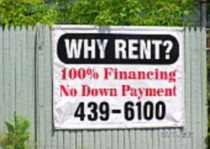Coach Mitch’s REFLECTIONS™
Warning: Check with a lawyer
These days, to prosper in the landlording business, we must have a legal and effective method of approving or to deny a tenant applicant. The list below is my personal opinion. Check with an attorney before doing anything. Laws change constantly, and what you don’t know can and will hurt you.
Many landlords think that they must accept the first rental prospect to walk through the door; not so. There many legally viable reasons to reject an applicant. Every prospective tenant must meet your numerous legitimate, businesslike standards or be rejected. All tenant screening standards should be listed in your Procedures Manual.
The list below can be the basis of your written criteria for an acceptable rental applicant and will be needed for your defense against Fair Housing discrimination suits. Have it ready in case an applicant wants to see it.

Objective vs Subjective
An objective reason to deny an applicant is something that is quantifiable and verifiable. Examples would include anything from the list below or information from a reference.
Subjective reasons cannot be verified and can lead to allegations of or actual instances of discrimination. Examples: you got a “bad feeling” or you didn’t feel like you “connected” with the applicant. Any statement about a rental decision based on a subjective feeling will get you in trouble, as you may inadvertently and unconsciously be discriminating against applicants.
The list below provides objective reasons to deny someone. You never want to say, “I didn’t like them.” If required to respond, only respond in writing, describing the behavior that made you nervous or the action making the applicant a greater business risk than the applicant you ultimately chose. The risk to your business is the standard to defend.
Except for reasons of bad credit, when rejecting an applicant, you are not required to cite reasons for denying any applicant. If choosing to give reasons for denying an application, never quote an illegal reason such as race, color, creed, religion, sexual orientation, nationality, familial status. Saying less is the best policy.
Only answer in writing
Don’t lie to an applicant, e.g. you “have already found a renter.” Just inform the applicant that you will review the application and contact them if chosen. If asked why someone else was chosen, express that another candidate was better qualified. If asked “how were they better qualified,” say that you “cannot reveal private information.” Other than credit, if the applicant insists on knowing the specific reason that they were denied then require that the applicant make their request in writing. Answer in writing, stating your reason in general terms, perhaps picking from the list below.
If turning down an applicant from data on a credit report, 15 USC 1681m(a) specifies the landlord should send a letter to the applicant regarding the adverse action.
[Sample letter] We regret to inform you that your application to rent 1234 Main Street has been declined. This action was in whole or in part the result of information contained in a credit report supplied by [Name of credit bureau, address, phone]. The credit bureau did not make the decision to take this adverse action and is unable to provide the specific reasons why the adverse action was taken. You can obtain a free copy of a report by making a written request to the credit bureau within 60 days of this letter. You can dispute with the credit bureau the accuracy or completeness of any consumer report furnished by them.
Generally, you are safe turning down an applicant as a poor tenant prospect if any reasonable business person in a similar situation would agree that renting to this particular person would pose an unacceptable business risk.
Applicants have differing levels of unacceptability.
1. Unacceptable: for credit or other reasons.
2. Unqualified: but can become qualified with a co-signer or with a large deposit.
3. Qualified: but another applicant is more qualified.
For your own protection, all landlords and property managers should keep good notes, stating the specific reasons that the applicant failed to meet your criteria. Attach any supporting documentation, e.g. the applicant’s credit report, a printout showing a prior eviction, or notes from your conversation with the applicant’s current or past landlord. When speaking to any reference, note anything negative stated about the applicant; these are good, objective business reasons to reject. Document when you decided to deny the applicant. Memorialize when you communicated with the applicant and exactly what was said. In NYS it is legal to record telephone conversations without informing the other party. The statute of limitations for most fair housing claims is three years.
When a rejected tenant does sue, if following good procedure, all will be in writing and easy to follow. You can provide the applications of other tenants’ and the reasons why they were chosen. A judge will very likely rule in your favor as long as you can provide a reasoned and non-discriminatory rationale for your tenant selection process.
As the person in charge and ultimately responsible and liable for what happens in your properties, all persons you allow to deal with prospective tenants must follow the standards you set and they must also follow the fair housing laws or you could be held legally liable. This includes all employees and agents of owners, landlords, property managers and real estate brokers. Your employees’ or agents discriminatory statements or conduct, including sexual harassment, are your responsibility.

Legally justifiable reasons to deny an application
1. All Info
a. Not filling in all requested information is reason to deny an application.
2. Providing false information on the application
a. You have good reason to legally deny an application if a potential tenant knowingly supplies you with false data or hides any negative information.
3. DSS, Section 8
a. On a property by property basis, decide if you will accept subsidized income applicants.
b. Many calls will be from applicants with subsidized rental income. If you don’t accept DSS or Section 8 then that disqualifies the applicant.
4. Illegal alien
a. The Fair Housing Act allows you to reject an applicant if they are not in this country legally. You cannot turn an applicant down based on their race or place of origin, but being in the US illegally is good grounds to reject their application.
5. Insufficient income
a. You must set up objective income criteria and apply them equally to each applicant.
b. Determine the DTI, Debt To Income ratio acceptable to you.
c. Insufficient income could reasonably be if the scheduled rent exceeded 35% of applicant’s gross monthly income.
i. For example, if the rent is $1000, the applicant’s gross monthly income must be at least $3500.
ii. The formula: Scheduled Rent = Acceptable Income X Income Ratio
d. Many landlords take 25% of the income and think it should cover rent.
e. You can require verification of all income and if income is not verifiable it is a valid reason for an applicant’s denial.
f. If you accept the income from only one member of a married couple, then you must also accept one income of unmarried co-tenant applicants. Under the Fair Housing law, unmarried people are not required to meet different income standards than married people.
g. In determining whether they can afford your rent, you must use both of the incomes of any couple, married or not.
h. The income of anyone signing the lease should be used in determining the total income available to pay rent.
6. Too many debts
a. Even if the applicant’s gross income is sufficient, the applicant may have so many other debts that they would be hard pressed to make all the payments.
b. A good rule of thumb is that all contracted debts, including rent, cannot exceed 50% of applicant’s gross income. Contracted debts would be such things as credit card payments, car payments, loans, etc.
i. Normally not included in contracted debts are: child care, cable TV, water, garbage, telephone, or other utilities.
c. Another method would be to include all expenses of the household and take a set percentage of what is left over to pay the rent,
i. Example: After all expenses allow 25% of remaining income for rent
d. Many landlords take the easy approach and just apply 25% of income for rent without figuring expenses. But, people often have hidden expenses.
e. Any income standard you create is OK as long as it is used equally for all.
7. Unsatisfactory job history
a. Establish criteria for the minimum length of time an applicant should be employed at same firm or in the same career.
b. A mitigating factor could be that the applicant is changing careers and not on the job very long, or still under probation.
c. A mitigating factor is that an applicant is moving because of a promotion.
d. Be sure the story makes sense, check with prior and new employers.
e. Not being able to verify employment or employment history is a red flag.
8. Unsatisfactory references
a. Not listing any of the references is reason to deny an applicant.
b. Unsatisfactory references from previous landlords, employers and/or personal references is good reason to deny an applicant.
c. Unsatisfactory references could include:
i. Reports of late payments of rent or security,
ii. Reports of repeated disturbance of their neighbors’ peaceful enjoyment of their homes,
iii. Reports of illegal activity, such as gambling, prostitution, drug dealing or drug manufacturing,
iv. Reports of damage to the property beyond normal wear and tear,
v. Reports of violence or threats to landlords or neighbors,
vi. Reports of allowing people not listed on the lease or rental agreement to live in the property,
vii. Reports of a failure to give proper notice when vacating the property,
viii. A landlord who would not rent to the applicant again,
ix. Reports of having a pet or allowing a pet visitation, etc. if a pet is not allowed in the lease.
9. Bad credit report
a. Determine a credit standard. A FICO of 600, 500, etc.
b. Most applicants have some level of bad credit.
c. Ask applicant about their credit history.
i. “So that I’m not surprised, what will I see on the credit report?”
d. You can ask people to bring their credit report when seeing the property.
e. A legitimate ground to reject an applicant as being too risky includes if a report shows the applicant is not current on a bill, is listed with a collection agency, or has been sued for a debt, etc.
f. Persons with a bankruptcy, a foreclosure or a judgment are bad risks.
g. Bad debts do not have to be connected with housing.
h. If denying an applicant on bad credit grounds, then federal law requires us to send an adverse action letter to applicant that they were rejected in part due to the information obtained from their credit report. See above sample letter.
i. The adverse action letter must contain the name, address and phone number of the credit reporting agency that provided the credit report.
10. Prior Evictions
a. An application fee can include a separate fee for an Eviction report.
b. Most “bad” tenant prospects won’t waste their money on an application fee if knowing that the landlord is checking.
11. Civil Lawsuits
a. You can deny an applicant that has been listed in a lawsuit, or been listed as a judgment debtor.
12. Frequent moves or too short rental stay
a. Establish what constitutes frequent moving and the length of a rental stay that is too short and apply the same criteria to every applicant.
13. Inadequate rental history
a. Suspicious rental reference, e.g. reference may be a fake.
b. Most Important: Applicant can’t verify rental history with two or more landlords.
c. The reasons for leaving each rental are not meeting your standard.
d. Applicant cannot prove rental payments with check stubs, dated receipts, etc.
14. Too short a time on the job
a. As with frequent moves, you have to decide what a too short employment time is and apply the same criteria to every applicant.
b. A promotion, a new position, or a new graduate often requires a move.
15. Too new to the area / Starter Checks
a. People who have just moved to town can be dangerous. They can also be excellent tenants. The time and expense to check references and prior employment could be worth it. Get application fees to cover costs.
b. Often the applicant will only have a brand new checking account with “Starter Checks.” Your standard may be to not accept these checks. Be sure to call the bank to verify the account and that the check will cash.
16. No Checking Account
a. If someone says that they don’t use checks, ask why. If they pay by money order or bank drafts then they probably cannot get a checking account because they bounced too many checks.
b. Banks no longer give checking accounts to those who have bounced several checks in the past. Goto http://chexsystems.com/ to see if your applicant is banned.
c. If your applicant uses an out of area checking account, it might be with a bank that creates accounts for those who are banned on ChexSystems.
17. Not Willing to Set Up Automatic Payment Plan
a. If applicant cannot or refuses to set up an automatic payment plan it can be a red flag that there has been a bad check writing history.
18. No verifiable source of income
a. Without a paycheck stub it is hard to verify income.
b. Commissioned salesmen can provide copies of checks.
c. Be careful of applicants who “work under the table,” getting undocumented income. It is not reliable. Be careful of mandated overtime. It stops.
19. Too many vehicles
a. Some applicants have several vehicles, of many types.
b. Vehicles include campers, boats, jet skis, ATV’s, snowmobiles, etc. Ask about the applicants “toys.”
c. If the applicant has more than one vehicle for each adult, there could be an issue with the property looking poorly, over crowed, and having issues with other tenants over few or well-placed parking spots.
d. College towns often have special rules regarding numbers of vehicles.
20. Too many occupants
a. You can decline an application to avoid overcrowding.
b. HUD’s recommendation of “two persons per bedroom plus one additional occupant” is a good rule of thumb.
c. Find out from local Code Enforcement what limits there are for the number of persons in a property.
d. Before the familial status protection clause of the Fair Housing Act, you could discriminate on number of people. The issue is more challenging now. Currently, the same criteria must be applied without regard to the age or the familial status of the inhabitant. Check the law.
e. In NYS, familial status extends to significant others’ and their family.
f. Over a certain age, occupants of different sexes should have different bedrooms. Use the law, e.g. this technicality might help you.
g. If you suspect that more people will move in then know the legal limits.
h. You can restrict having more than two persons per bedroom. i. You can put into the lease, and I do, the specific persons and pets to whom you are renting and that each person staying in the home more than two weeks shall pay an additional rental fee of $50 per day. This discourages the moving in of persons with or without familial status.
21. Pets
a. Most landlords no longer accept pets.
b. If you do accept pets, have a separate Pets Addendum listing your terms.
c. Require significant pet security. I’ve never gotten enough security to cover the damage from a pet, particularly cats.
d. Require tenants insurance to cover the pet for bites. e. List the pet name and description in the lease and state that any additional pet shall bear an additional rental cost as well as more security deposit. f. These days, Homeowners and Landlords insurance policies have pet restrictions. Blame the insurance company for your denial based upon a restricted pet, typically certain dogs, Pits, Rotties, etc.
22. Smokers
a. Many mistakenly believe that smokers are a protected “handicapped” class. The tobacco companies lobby against this. You can safely discriminate against people who smoke.
b. Newspapers sometimes won’t accept ads saying “no smokers,” as this sounds discriminatory, but they will accept “no smoking,” as this is a rule.
c. If you allow smoking, you can charge an extra and specific smoking security deposit to cover the cost of the special stain covering paint needed to cover tobacco smoke stains when the tenant moves.
23. Wrong type of employment
a. Certain employment types are more dependable than others.
b. Some landlords only rent to those applicants who it is felt will not leave a job if a judgment is taken against them, e.g. a government worker.
c. Seasonal workers are usually very short term renters.
24. Wrong category of tenant
a. Some landlords won’t rent to lawyers, others prefer law enforcement officers. My best tenant was a NYS Trooper.
b. Some landlords seek cat owners, professionals or travelling salespeople.
c. Some landlords cater to college students or persons in construction, etc.
25. No ability to accommodate a person with a disability
a. You are not required to make unreasonable changes to the rental to accommodate a particular disability.
i. E.g. Putting in a new, bigger bathroom to allow for a wheelchair.
b. Reasonable changes can be required.
i. Security handle bars around the toilet and the shower for wheelchair bound renters.
ii. Allowing a light as a doorbell for a hearing impaired person.
iii. You must allow a service animal.
26. A history of late rental payments a. This proves applicant is a bad risk
b. You can ask for proof of previous rent payments.
c. A landlord’s letter can indicate the applicant’s history but it should be verified as it could be a forgery.
27. Drug use
a. Applicant must be current drug users. If they are in a drug treatment program and no longer use drugs, the Federal Government considers them handicapped and protected by the Fair Housing Act.
28. Evidence of illegal activity
a. If suspicious, collect monies for a Criminal Records check.
b. You need satisfactory evidence of criminal behavior. Get a police departments printout showing an applicant’s illegal activity. Best are any warnings to landlords about an applicant’s previous illegal activities.
c. Check free online public records for criminal history.
d. Check sex-offender registries to ensure you don’t rent to one.
29. Conviction of a crime which was a threat to property in the past five years
a. Crimes could include convictions for drunk driving, burglary, robbery, nuisance, bouncing checks and other such misbehaviors.
30. Controlled substances
a. A conviction for the manufacture or distribution of a controlled substance in the past five years warrants an applicant turndown
31. Offensive behavior
a. Have a complete list of behaviors that you find offensive; add bad behaviors as they show themselves. Choose words carefully.
b. The list can be subjective as long as it is stated in an objective manner.
c. All negative behaviors can indicate an applicant that could be a risk.
d. Bad Example: saying someone was rude is subjective and discriminatory.
e. Good Example: An applicant arriving late to an appointment without calling is an objective standard.
f. Bad Example: saying someone is crude is subjective and discriminatory.
g. Good Example: An applicant discarding garbage inappropriately is an objective standard.
h. Bad Example: Saying someone is a bad parent is subjective and discriminatory.
i. Good Example: Observing the applicants children as not being under control and being disruptive is an objective standard.
j. Bad Example: saying someone is loud or abusive is subjective and discriminatory.
k. Good Example: Describing the applicant yelling at or berating someone is an objective standard.
32. Not an elderly person
a. If you rent to elderly persons there are special rules and you can legally deny non-elderly persons.
b. Fair Housing laws, exempt “housing for older persons” from the prohibitions on “familial status” discrimination.
c. Housing for older persons is defined as either of the following.
i. Housing occupied solely by persons 62 years of age or older; or
ii. Housing in which 80% of the occupied units have at least one person 55 years of age or older, and which meet other additional requirements.
d. This exemption applies only to familial status discrimination; discrimination against all other protected categories, including disability, is prohibited in housing for older persons.
********************
Procedure Manual
Having a procedure manual is mandatory, especially if you have others taking applications and showing your properties.
List all the areas mentioned above and cover specifically what is acceptable. Something other than being acceptable is not acceptable, and legally deniable.
I have been to court and have been successful in getting a judgment when I could show the judge that my procedures were complete and fair. I have not seen a judge require that you be perfect. They know that there are practical limits but they must also follow the rules. You will have a bit of leeway, but be very careful how you state anything.
If you are going to be a long term landlord, then prepare. Otherwise, consider just being an investor and flipping. In either case, See Coach Mitch’s “Ridiculously Simple System…” ™ for details on getting property at very low prices so you have a better chance of absorbing any losses.
Be a professional –








Leave a Reply